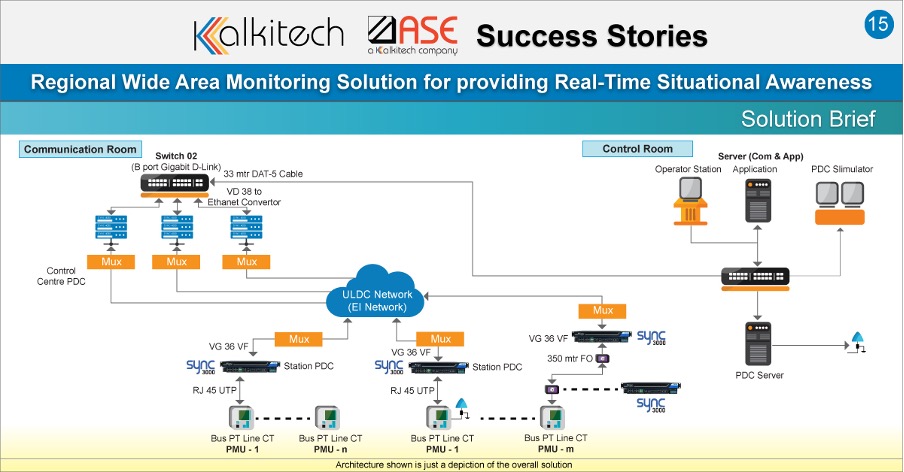Regional Wide Area Monitoring Solution for providing Real-Time Situational Awareness with SYNC4000
Kalkitech December 25, 2023

Kalkitech December 25, 2023

Customer: Electric Utility in Western Region - India
Industry: Electric Utility
Business Case:
The Load Dispatch Centre is responsible for ensuring integrated operation of the power system in the western region of India which includes the states of Gujarat, Maharashtra, Madhya Pradesh, Chhattisgarh, Goa, and the union territories of Daman and Diu, Dadra, and Nagar Haveli. It covers 951,000 sq km and serves a population of 273 million – more than 30% of the area and population of the country. With the opening up of the Indian power sector, the western region witnessed rapid growth characterized by vast capacity additions through the rollout of independent power plants and ultra-mega power plants and increased open access transactions across regions. As a result, several substations were established in the western region to transmit the generated power leading to complexities in the network. The spread and scale of the network adversely impacted visibility and effective monitoring of the system which could potentially result in power outages and other cascading effects. LDC also lacked a system to trigger alarms warning of adverse events such as large-scale blackouts and cascading effects. Real-time situational awareness of the grid is key to ensuring the reliability of the power supply and preventing outages. Hence, LDC decided to implement a wide-area monitoring system (WAMS) to handle the growing scale and complexities of its network, monitor the electric grid, and prevent adverse impact caused by system instabilities
To summarize, the utility faced the following challenges:
The LDC invited tenders from solution providers with expertise in building WAMS. The ideal solution demanded proficiency in communication and automation as well as system integration and operation. With a cost-effective solution that was successfully implemented on a trial basis for the Southern Regional Load Dispatch Centre, Kalkitech emerged as the winner in the tender review process
The Solution:
Kalkitech’s solution included both products and professional services including:
• Deployment of Kalkitech SYNC 4000 Control Center Front End deployed as a wide-area monitoring front end and Phasor Data Concentrator (PDC)
• Supply and installation of Phasor Measurement Units (PMUs) along with the GPS
• Installation of Suitable Historian Software
• Visualization tools included an oscillation monitoring system, event analysis engine, and damping monitor engine.
Kalkitech deployed an end-to-end WAMS solution spanning site survey, planning, design, engineering, manufacturing/integration, and testing for the LDC. It also included a general user interface for real-time situational awareness and advanced applications for wide-area monitoring. PMUs based on the IEEE C37.118 protocol were sourced from a third-party vendor and installed at strategic locations across various states, along with GPS systems. Kalkitech installed its high-performance scalable SYNC 4000 PDC and protocol conversion gateway at the LDC control center to acquire data from up to 14 PMUs in real-time. Using the Historian, Kalkitech enabled the collection and archival of PMU data and integrated the visualization system with the online Historian environment. The western region PDC was integrated with the northern region PDC for effective grid monitoring. The user interface provides a 360-degree view of the electric grid, allows monitoring of voltage differences and frequency instability, and helps identify regions that may be operating under stressed conditions. This helped LDC proactively initiate action to prevent outages. Real-time wide-area measurements from PMUs provide the oscillation monitoring system (OMS) with timely identification of oscillation events that trigger alarms when deviations from normal operating conditions are detected. The OMS framework included an event analysis engine and a damping monitor engine. The event analysis engine monitors system events in real-time. The damping monitor engine of OMS analyses ambient PMU data scans the system and provides timely warnings when the system is operating at the brim of small-signal instability.
Key Benefits:
With Kalkitech’s solution the WRDC realized multiple benefits:
• Efficient and standards-based data collection from PMUs for real-time situational awareness.
• Timely analysis of PMU data for critical insight on grid stability and to help prevent blackouts and cascading effects.
• Preventive analysis of grid variations in real-time resulting in quick identification and resolution of issues.
• Enabled emergency control through real-time monitoring of system events.
• Increased equipment life through better grid stability.
• Improved ability to monitor the grid across the region which could potentially prevent blackouts and adverse impact on the economy.

July 25, 2025
The world energy scene is being revolutionized by the fast-paced increase of decentralized renewable energy sources like rooftop solar, wind microturbines, and energy storage in batteries. batteries. The driving force…
Know More
July 25, 2025
Smart metering has evolved significantly over the last two decades as it became a building block of modern energy management solutions. At the core of the evolution is the DLMS/COSEM…
Know More
July 25, 2025
As the energy sector undergoes rapid digital transformation, smart metering has emerged as a foundational technology in modern utility networks. By enabling real-time monitoring, automated billing, and remote disconnection, smart…
Know More